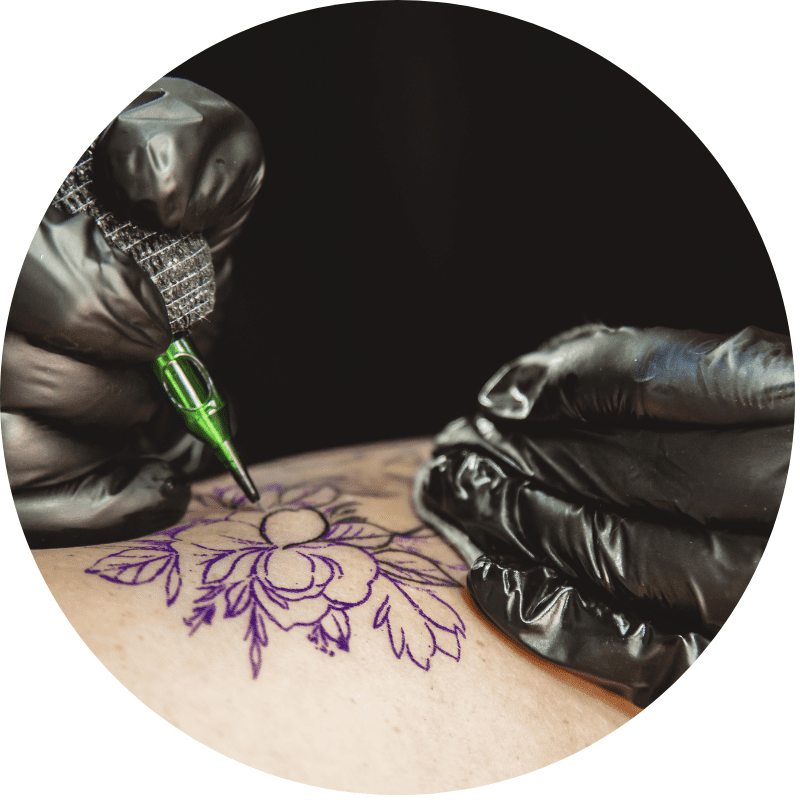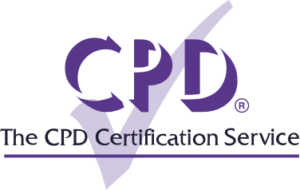In this Tattooists CPD Guide
Why do Tattooists need CPD?

A tattoo is a permanent design or image that is made by inserting ink or other pigment into the skin using a needle. Tattoos can have cultural, religious, personal or decorative meanings and are often used as a form of self-expression. A tattooist is someone who creates the permanent designs on people’s skin by injecting ink into it using needles.
What our customers have to say
Dan King
Mobilisation, Training & Performance Manager

Sophie Aiken
HR Manager

Harriet Lee
Retail Recruitment Manager

What CPD courses do Tattooists need?
Being a tattooist involves planning and preparation of the workspace ensuring cleanliness and hygiene are up to standard. It is a customer-facing role, making customer service skills also important, on top of being skilled in the trade.
We have listed some of our courses that are well suited to the role of a tattooist below:
Workplace First Aid – in this course you will learn how to treat injuries that may occur in the workplace, as well as some of the common illnesses that workers may experience, what the signs and symptoms of each are and how to treat them. Our First Aid training also covers how you should keep records of any incidents that take place in the workplace.
Complaints Handling – working in customer-facing roles means that you may, at times, receive complaints. This can be daunting, especially if things escalate quickly. But there are ways to turn things around. If done right, the original complaint may even earn a great review, renewed loyalty from your customer or service user, and even positive attention on social media channels. Our Complaints Handling course will ensure you gain new knowledge on handling complaints in the correct way; this will impact your business/workplace in a positive way and will reduce the risk of lost custom.
Customer Service Skills – in this course, you will learn that the customer experience is seen as one of the most important things for any business, small or large. You will also gain a greater knowledge around providing quality customer service and how you can adapt to changes and alter your approach to suit everyone. Being able to anticipate the reactions or expectations of customers is essential in doing your job and you need to be able to work with customers and listen to their queries in order to provide a good level of service.
Equality and Diversity – this Equality and Diversity course will cover all concepts of equality and diversity and cover discrimination in detail. We will look in depth at the four main types of discrimination and examples of each. The Equality Act 2010 will be covered, and you will learn the nine protected characteristics and examples of each. Our Equality and Diversity course will finish off by exploring real-life case studies of harassment, bullying and discrimination and you will consider what the effects of these can be on a person’s physical and mental health.
HAVS (Hand-Arm Vibration Syndrome) – in this course you will explore the term hand-arm vibration syndrome (HAVS) and that it is used to describe a group of disorders that are caused by exposure to vibration, which will be addressed throughout this course. This course will look at the early signs and symptoms that employees must be made aware of if they are to be exposed to vibration in the workplace.
Health and Safety for Employees – this course covers a large number of different areas and is designed for new and existing employees to develop their knowledge of safe practices in the workplace. In order to ensure a safe and harmonious working environment, all employees should have a strong knowledge of health and safety legislation. It covers hazards and risks as well as how to carry out risk assessments, something which is required when any business has more than five employees.
Needles and Sharps – in this course we will be looking at the laws surrounding sharps, how employees can keep themselves protected, as well as using needles and sharps safely and why this is so important.
Time Management – as a tattooist there can be a lot of time pressure managing appointment times. This course will help you feel more in control of your time and levels of stress, as well as manage others to be able to support them more effectively. By understanding how time can be managed and used effectively, you can improve how you use your time, so that less time is wasted, and more time is spent on the things that are important to you.
GDPR – this course will provide an understanding of the legislation surrounding the GDPR and help to assist understanding in how personal data is used. Businesses must comply with new GDPR legislation or they could get into serious trouble, and this course covers how information should be collected in order to be lawful. It will also look at how data can be extracted, processed and stored, as well as what an individual’s rights are surrounding their personal information.
Understanding Phobias – as a tattooist you may come across customers who may have a fear of needles. This course will teach you what a phobia is, and how to start the process of overcoming phobias, and what feelings are experienced by someone with an extreme phobia.
Download our CPD trackerA guide to CPD for Tattooists
A tattooist typically needs artistic talent, steady hands, attention to detail, good communication skills, and knowledge of proper safety and hygiene practices. They may also benefit from training in design, colour theory, and how to operate tattoo equipment. It is extremely important that tattooists adhere to health and safety regulations to prevent the spread of infections and diseases on themselves, staff and customers. This includes maintaining a clean work environment, using sterile equipment, and proper disposal of waste. They also need to follow proper hygiene practices and wear protective gear such as gloves and masks.
There are several risks associated with being a tattooist, including the potential for exposure to bloodborne pathogens, skin infections, and allergic reactions to tattoo ink. This makes knowledge of health and safety protocols paramount. Continuing Professional Development (CPD) is highly recommended so that tattooists continue to educate themselves and stay up to date with the latest techniques, health and safety practices, and industry trends. This can help ensure that they are providing the best possible service to their clients and maintaining a high level of professionalism.
CPD certificates
Once you have completed your course you should feel extremely proud of yourself. You will have a CPD certificate as soon as you have passed the end of course quiz which will signify the time you have spent on the course and the new knowledge that you have gained. We advise you to save your CPD certificate on your computer to keep it safe.
Logging CPD hours
The time that you have spent on your CPD course can be used to create a CPD portfolio. This will showcase all of the CPD training that you have worked on. A log of CPD hours is the total time spent on each CPD training activity. To create this, you can note down each date that you work on CPD training, the type of CPD training that you worked on, and the number of hours spent on your learning. That way, it is easy to show to your employer or industry experts your ongoing learning.
Keeping evidence
There are many CPD training activities that you can do alongside completing a CPD course. Completing a mixture of CPD training can help you to gain holistic knowledge for your job role.
As well as CPD courses, you can complete other training activities such as:
- Completing workshops.
- Researching new techniques.
- Working with a mentor.
- Attending conferences.
- Practising artwork.
- Learning new software.
Whichever CPD training activities you decide to do, you should keep evidence of what you have done. This can be either as paperwork or electronically. Together with your CPD logged hours and your CPD certificate you can create a well-rounded CPD training portfolio.
Renewing CPD certificates
Your CPD certificate should be renewed every two years. It is easy to do this with CPD Online College by simply completing a refresher of the course you have completed previously, or by completing a higher level of your course. Renewing CPD certificates is important because it keeps you up to date with the latest trends and techniques as well as ensuring you are health and safety compliant and competitive in the industry.
























